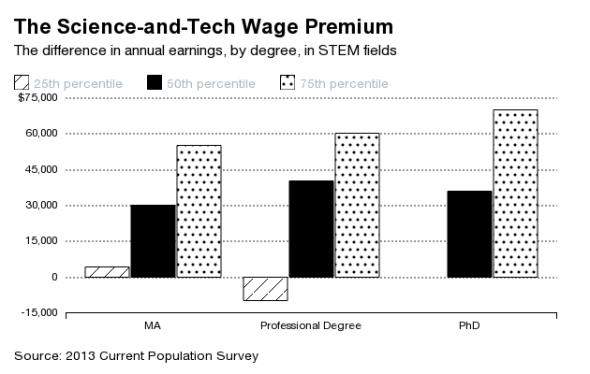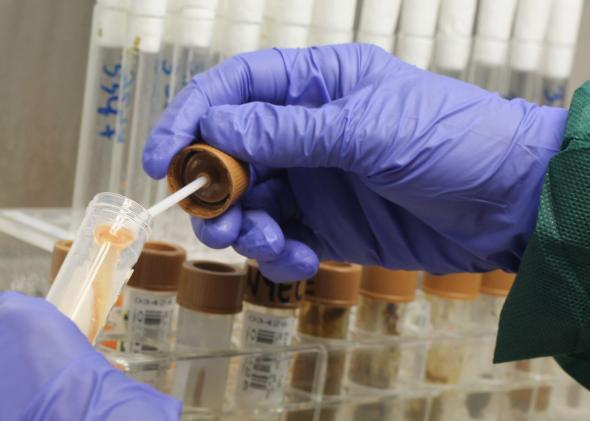For young science, math, and engineering Ph.D.s just graduating from school, the labor market is far weaker than most would probably guess given the constant refrains from industry about talent shortages—a point Slate illustrated last month in a post using National Science Foundation data. But writing at Bloomberg Businessweek, economist Allison Schrager suggests I’m exaggerating the plight of America’s lab nerds. While pickings might be slim when they first start job hunting, she writes, their degrees do pay off over time. As she puts it:
Ph.D. job outcomes right out of graduate school aren’t the right data point. It often takes time for Ph.D.s to find the right job. Ph.D.s are patient, risk averse people; their degrees take time to pay off. Even when they do, expected salary isn’t all that matters; we also place a high value on security. The better news for advanced degree holders is more education means a lower unemployment rate.
All fine points. Midcareer, science and math Ph.D.s tend to make respectable upper-middle-class salaries, if not more. Most people study biology, chemistry, and physics because they’re curious minds who love the work, not because their life goals center around a house in Greenwich and a German sports car. Unemployment among Ph.D.s—and especially Ph.D.s in the sciences—is indeed exceptionally rare (the rate hovers roughly around 2 percent).
Still, I think Schrager’s post perpetuates some issues that affect conversations about the world of science, tech, engineering, and math—aka the STEM fields. Take, for instance, this chart she produces, based on Census data, showing how much more money 35-to-50-year-old workers in STEM occupations make with a graduate degree compared with a bachelor’s. The median Ph.D. can expect to earn a $30,000 per-year premium compared to a mere college graduate. Doctorates also generally outearn master’s degree holders—who often pay more for their educations, since science Ph.D.s tend to be funded by their universities.

So what’s the problem? First, as Schrager acknowledges, not all STEM fields are alike. There are different labor markets for engineers, biomedical scientists, computer scientists, and chemists, and lumping them together can be misleading. In this case, the chart also blends them with social scientists like economists, who are sometimes included in definitions of STEM (the full list of occupations included in the graph are listed between numbers 1,000 and 2,000 here). In the end, these numbers are an amalgam that doesn’t tell us much about career prospects for any one kind of student.
Here’s the second issue. The chart looks exclusively at opportunities within STEM jobs. But one of the biggest problems facing the sciences right now is that students who are smart enough to pursue a Ph.D. would probably be more financially successful in a field like banking, consulting, or law. The question isn’t whether you’re better off getting a Ph.D. in biology or just working as a lab tech for the rest of your life. It’s whether you’re better off with a Ph.D. or an M.B.A. that will take you into management. Often, the answer is the latter. As Anthony Carnevale of the Georgetown Center on Education and the Workforce has put it, “If you’re a high math student in America, from a purely economic point of view, it’s crazy to go into STEM.”
That quote leads to a bigger question: Will the sciences be able to keep being able to attracting the best American minds, given the career opportunities they offer? Now, and in the near future, I think the answer is still yes—because most people study science for love, not money. And Schrager’s right that most Ph.D. scientists seem to enjoy fine careers over the long term, even if their early years out of school can be rough going. But that doesn’t mean we should ignore the problems that already exist in the science economy. Otherwise, they could easily get worse.
